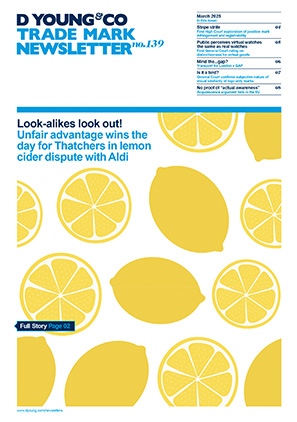Aromatic botanicals: the pitfalls of choosing a company name
In the United Kingdom, as is the case elsewhere around the world, business owners are reminded to ensure that any new name they choose for their company should not infringe trade marks owned by third parties.
It is also important that one’s name is not so close to an earlier registered company name that its use would be likely to mislead consumers
This issue arose in a case before the High Court and involved a dispute before the Company Names Tribunal in the UK. One party complained about another party’s registration of a company name which it deemed was too similar to its own. The other party alleged that the complainant did not have goodwill in its name, a basis for lodging a valid objection.
This case considered the correct date on which the claimant’s goodwill should be assessed.
Facts
In November 2019 the name Botanica Agriculture and Extraction Ltd was adopted by the claimant, which then complained about the incorporation of a new business, Botanica Ltd, in April 2020. It alleged the name was substantially similar and, further, that it had acquired goodwill in the name Botanica.
Company Names Tribunal decision
In September 2020 Botanica Agriculture and Extraction Ltd applied to the Company Names Tribunal for an order requiring Botanica Ltd to change its name.
The Companies Names Tribunal considered the relevant date for determining whether the applicant had acquired goodwill in its name. Is it:
- when the later company is registered, in this case in April 2020; or
- when the complainant lodges its complaint?
The Company Names Tribunal held that it was the former, and that in April 2020, a mere five months after adopting the name itself, the complainant had not established or shown that it had generated sufficient goodwill in the name Botanica.
The appeal
The complainant appealed to the High Court, which concluded that the correct time for determining whether goodwill had been acquired was, in fact, the date on which the Company Names Tribunal complaint was lodged, in this case, five months later.
The High Court did not reverse the Company Names Tribunal’s decision. Instead, it ordered the Company Names Tribunal to consider the matter again.
What are the takeaway points?
First, the High Court decision was not in fact surprising given that the Company Names Tribunal had previously held that the correct date for showing goodwill is the date of the filing of the complaint. In this particular case, the Company Names Tribunal had simply not followed its previous decisions.
Second, and more relevant for claimants, it is important to ensure that sufficient evidence is shown that goodwill has been generated as at the date of the challenge.
Third, and finally, an important point to remember is that if the defendant can show that continued use of the challenged name would not be likely to mislead, then, notwithstanding the complainant’s goodwill, it is likely the complaint will fail. When submitting evidence as the claimant it is important to be wary of any response from the defendant in which it states that it is trading, as this can lead to the application being struck out. In such a case, a request for a hearing can still be made.
The Company Names Tribunal deals only with complaints where a company name is registered for the primary purpose of preventing someone else with legitimate interest from registering it, or demanding payment from them to release it. This is a narrow remit – it is not a substitute for a trade mark infringement or passing off action. For example, the International Business Machines Corporation (IBM) failed in a complaint against the Indian Institute of Business Management (IIBM), despite the names being held to be similar.
Case details at a glance
Jurisdiction: England & Wales
Decision level: High Court of Justice
Parties: Botanica Agriculture and Extraction Limited and Botanica Limited
Date: 26 October 2022
Citation: [2022] WLR(D) 498, [2022] EWHC 2957 (Ch)
